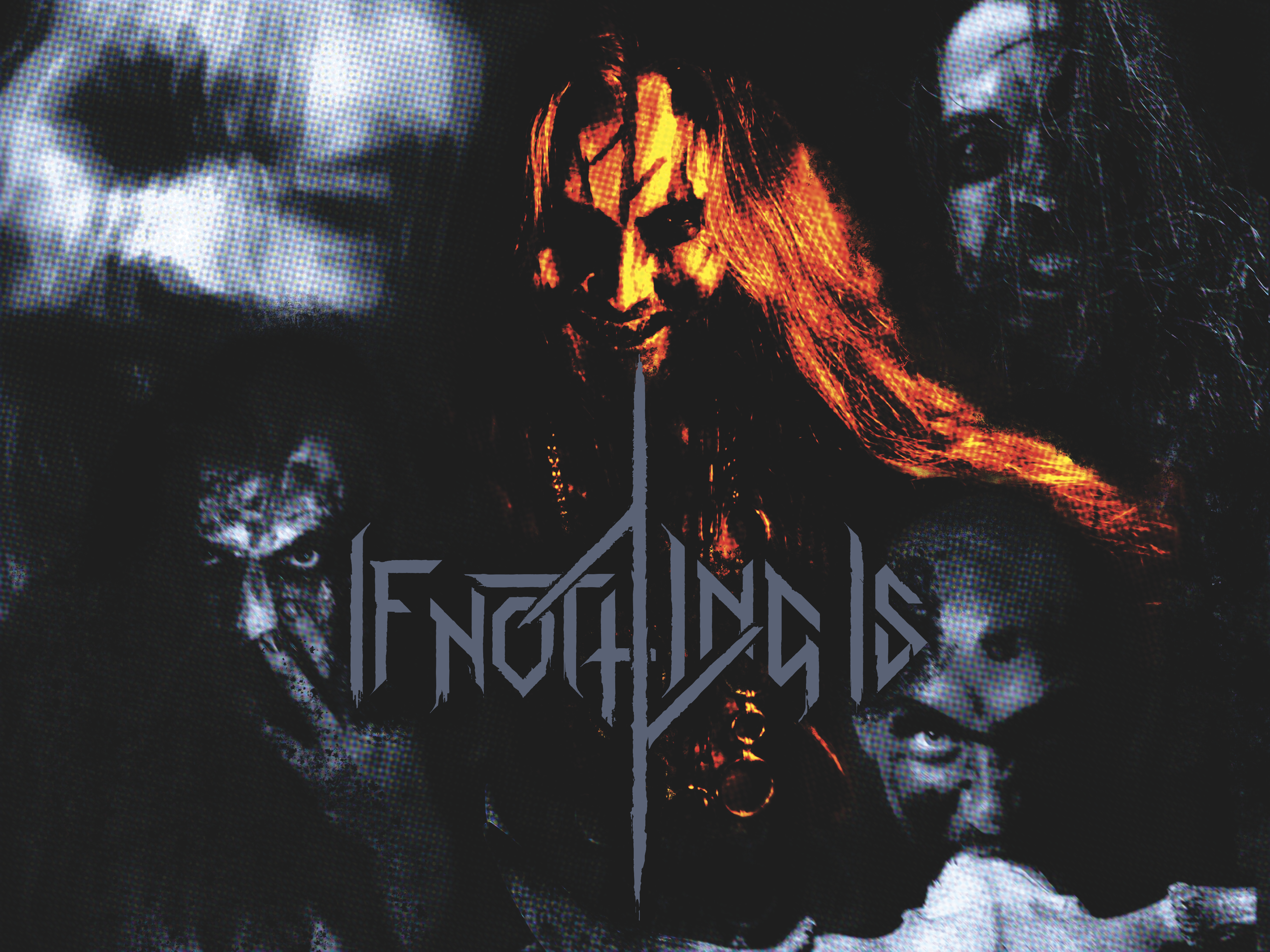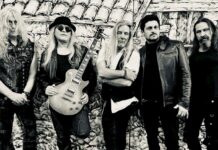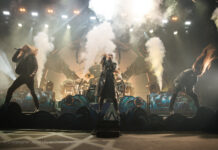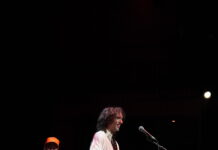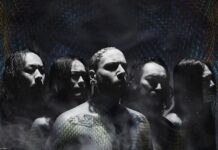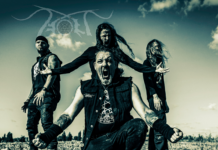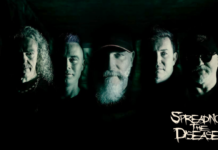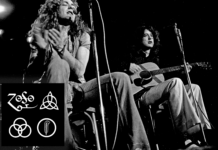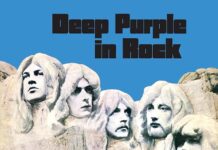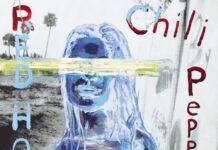Yours truly had a profound musical experience back in September 2021, when Dark Essence Records unleashed a remixed and remastered version of the self-titled debut effort by Norwegian avant-garde (black) metallers If Nothing Is. The record was something out of the ordinary in every conceivable way and listening to it was akin to a downright spellbinding albeit dangerously dark journey through twisted corridors and claustrophobic chambers. Rich in atmosphere, complex without being impenetrable, and utterly compelling, the LP offers a glimpse of something surreal, something nightmarish yet strangely beautiful and thought-provoking too. Those of you who are into Ved Buens Ende, Dødheimsgard, Nidingr, and Skaldic Curse seriously ought to check this band out. RAMzine caught up with mastermind Lars Emil Måløy to discuss this deftly executed piece of work.
Greetings L.E., how are you and what have you been up to today? Thanks for taking time out of your busy schedule to talk to us – much appreciated.
L: The pleasure is all mine! It’s nice to take a step back and talk about music instead of working on it.
Today has been work, work and work. First at work, then after work, and now I’m working on this interview, ha-ha. I was doing some vocal editing for the next If Nothing Is album just before starting this interview. Most of the tracks have been delivered to the mixing engineer, but some songs have a little more work left before the vocal edits are finished. I’m also working on a new lyric as I decided to change up one of the songs and redo the vocals, but that is the final missing part of the album. I also work on some images for the booklet from time to time, but I think I’ll have to find someone else to do that job. I simply don’t have the time. I also prefer to have someone else do the mix and mastering as it’s very hard to have an objective view on something you’ve been working on for years. Luckily, I’ve found the perfect man for the job, so I can just sit back and relax knowing the album is in good hands, the best hands actually!
To me it feels as if your self-titled debut has been reborn in the sense that it has been remixed and remastered not to mention revised with respect to its artwork and layout. How did you feel about revisiting a record that is to all intents and purposes six years old and then giving it a facelift of sorts and bringing it into the new decade? It sounds sharper and more vital than ever before and is simply a stunning and flawless piece of work. Was it an interesting experience to go back and work on it anew and has the whole process involving its re-release been inspiring and fulfilling to you?
L: Thanks for the kind words, I really appreciate it! Going for a new mix and remaster for the physical release of the debut album was a no-brainer, and the same goes for the artwork. It was composed, rehearsed, and recorded between 2008 and 2012, I think, and then there were three years of mixing it and going over every tiny detail. I did the mixing and mastering that time around, and looking back now, I couldn’t really do it justice as I was so used to the way it sounded during the process. If I changed things up to see if it sounded better, I couldn’t really tell and usually went with the way it sounded as that was what I was used to. So Bjørnar Erevik Nilsen from the band Vulture Industries and Dark Essence Records did the mixing this time around, and Herbrand Larsen did the mastering. Both of them were really easy to work with and understood what needed to be done to improve everything.
Revisiting the old project files to export all the tracks of each song and double-checking if everything had been exported the right way was a really tiresome job though (that’s many hours of A B checking). Then for every version of the mix I got from Bjørnar, I had to A B check with the original release to see if all the elements still had more or less the same balance between them and also to make sure it sounded better than the original. So, an album that already took seven years to make started taking even more years to complete. But in the end, it was well worth it, and placing the LP up on the wall was pure magic!
How exactly did it come about that Dark Essence Records offered to re-release your stellar opus? Did they come knocking and basically just ask if they could do a re-release of the album involving a remix and a remastering? The quality of the music speaks for itself, and it certainly deserves to be heavily promoted so that it can reach a wider audience, so I am thrilled that they released it in 2021.
L: Yeah, that’s pretty much it. We already knew that Dark Essence Records would be a fitting label for us, so I think we said yes right away. The people working at Dark Essence Records are a lovely bunch, and they have a real passion for what they do, so I don’t think we could have found a better label to work with.
The self-titled LP is an infinitely complex and layered piece of work that you can listen to again and again without ever growing tired of it. There are so many nuances, subtle details, labyrinthine structures, and wildly inventive twists that it defies belief, and there is an awful lot for the listener to absorb here. Who or what inspired you to compose and craft compositions of such dense, experimental nature? Are there any genres in particular that serve as a huge source of inspiration to you with respect to If Nothing Is?
L: When I wrote the album, I was still a teenager that easily became bored if I understood how almost every part of the music was going to develop at the start of every song. I craved complexity and surprises as a listener, so writing a complex album kind of came naturally to me. When working on the album I often tried to make sense of parts and ideas that shouldn’t theoretically fit together. When the different elements finally made sense, it almost felt like magic to me, so I just wanted more of that feeling and continued my search for it. Sometimes I found out that the basic idea was all that I needed, so in those instances I deleted all the extra layers of complexity and went back to the original idea. Then playing the songs at rehearsals and experiencing how good the songs felt in real life was another part of the magic.
A big inspiration for the first album was Dødheimsgard. This was way before I joined DHG and also before I got to know Vicotnik (main man in DHG). I felt that it was music for people who were tired of metal and wanted something completely different but growing from the same substance. Every DHG album feels as if it’s been made in another world, and they are just blistering with emotions. Listening to DHG back then was almost like experiencing magic or divinity! There were a lot of other influences as well from many different genres, but DHG was most definitely the biggest one.
I really love composing music, but finishing up stuff (mixing, mastering, artwork and so on) is a really tiresome process for me. That too is creative, but it feels more like work than anything else. If I am to write a third album for If Nothing Is, one of the most important things before we start the whole process is to find a way to do everything in one hectic period and outsourcing all the tiresome tasks to people who love to do those things. We also need to find out what that album should be like as we don’t want to repeat ourselves, and we don’t want to make music that has already been done before. We don’t have a complete solution yet, but the thinking process has started as well as some basic musical constructs.

Lyrically, what exactly do the words and phrases revolve around and is it possible for you to either discuss or elaborate on them without revealing too much of their specific content or meaning?
L: They were written between 2008 and 2012 and revolve around what we found interesting at the time. In general, the lyrics revolve around misanthropy, nihilism, the vastness of space, lunacy, and a dose of post-apocalyptic madness. So not unusual themes for metal lyrics, but I think they were written in a clever way and do not completely match your “standard metal lyric”. A good portion of the words and phrases are based on feelings and structures that are not that typical for metal, so in combination with the somewhat strange music I think it makes for a great package. One example of unusual stuff is this section in the song ‘Sovereign’ where the same sentence is sung left and right, but in one ear it’s “we are not…” and in the other it’s “I am not…”. Another example is in the song ‘Apsylum Absolute’ where several sentences have multiple meanings if you can figure out the riddles and play of words. Another one is the song ‘Postapo Calypso’, which in itself is a play of words. At the beginning of the song, all the different districts he sings about have prime numbers that add up to 101, which is another way we like to write INI, which again is short for If Nothing Is.
Is there an overall theme, a general idea, or perhaps a loose concept to If Nothing Is?
L: Musically speaking, I feel it right away when I make something for If Nothing Is. I can play it over and over for hours when everything feels right, and it’s almost like entering a dream world where time stands still. So, one thing all the music for If Nothing Is has in common is that it’s the truest expression of the music I have inside. It comes straight from the heart, so to speak, before being severely experimented on, ha-ha.
As to the name of the band and album, one could argue that it has a certain nihilistic ring to it, but perhaps that is merely conjecture on my part? Or is nihilism indeed a part of your musical creations?
L: One interpretation of the phrase could be that if nothing is real, then there shouldn’t be too many boundaries on the music that comes out of it. There are many different ways to interpret the phrase, so that is just one of the ways I think of it. I like that the phrase is so open that it can mean many things, and it has a ring to it that just clicked with me right away.
For me, nihilism is not the main thing I think of when reading the name, but I certainly understand how it can feel a bit nihilistic. Perhaps that was my way of interpreting it as well when we first came up with the phrase many years ago. It’s kind of hard to remember.
Do you recall what your very first metal album purchase was and where it all started for you?
L: My dad worked together with the guitar player of Keep of Kalessin, so when hanging around at his office he suddenly gave me his new EP called Reclaim. I loved it to death, and it is still one of the best releases I’ve ever heard. Before that my friends and I were more into technical death metal, like Behemoth and such, but that album helped me fall in love with combining atmosphere and complexity. As I loved Attila’s vocals on Reclaim, it didn’t take long before I bought myself a copy of De Mysteriis Dom Sathanas by Mayhem. Then I found out that Frost, who also played on Reclaim, played the drums on Beyond the Apocalypse by 1349, so it didn’t take long before I bought that album as well. That album was technically brilliant, had atmosphere and sounded like utter chaos, and that was my newfound passion in music. I played along to that album from start to finish at least once every day on bass or guitar.
What inspired and drove you musically during your formative years and what were some of the most important records to you when you were a teenager? And when did you pick up an instrument for the first time?
L: After understanding more about what black metal was, I got really into that. I listened to a lot of other genres as well, but for a time black metal was the main interest. For some time, I was more or less like your average black metal teenager listening to all the classic records, but after a while I felt a lot of the newer BM releases were just boring copies of the great albums that came before them. Then I was introduced to Dødheimsgard, Ved Buens Ende, and Virus – and that really appealed to me. They sounded like something from the future or from another world. That was my cup of tea and has been so ever since. The most important records for me at that time were 666 International and Supervillain Outcast by Dødheimsgard, Written in Waters by Ved Buens Ende, the self-titled album by Thorns, Beyond the Apocalypse by 1349, Anthems to the Welkin at Dusk and Prometheus by Emperor, Fractal Possession by Abigor, FAS by Deathspell Omega, Reclaim and Armada by Keep of Kalessin, and the list goes on.
I became really obsessed with practising guitar and bass, and I spent four to seven hours rehearsing every day. If we went to our cabin one weekend, I needed to bring my bass to make sure my fingertips weren’t getting soft. I used to play along with fusion, jazz, metal, rock albums, or anything that I fancied at the time. I guess a lot of the more fusion and funk parts in our music originate from that as well as the fact that Vegard (drummer of If Nothing Is) and I are playing in a fusion band together with our good friend Bård, who played a lot of the guitar solos on our debut album.
Do you have any hobbies outside of music and what have you been immersing yourself in during the pandemic? Films, books, TV series, documentaries, photography, or anything of that sort?
L: I’ve been working full time throughout almost the whole pandemic, so I haven’t had any more time on my hands than before. But yeah, I am a sucker for movies and video games, like many other people, I guess. I especially love sci-fi like Mass Effect, Dead Space, Star Wars, Battlestar Galactica etc. I also started to learn photo editing some years ago as I needed the skills for the physical release of our debut album, so I try to hone those skills from time to time. Audiobooks are also a big part of my everyday routine as I drive about two hours every day for work. I guess it’s pretty stereotypical for metal people to read these, but I’ve heard almost everything by Richard Dawkins and Christopher Hitchens, among others of course. Also, anything related to physics, science, psychology, and space are of interest.
Are there any rumblings in the DHG camp these days? Are you by any chance working on some new ideas together? It is such a brilliant musical outfit, and no two records are ever the same. A new DHG album is always a monumental event to yours truly.
L: The next album has been recorded and is now in the process of being mixed. You’ll just have to sit tight until the mix and master are done and it’s ready to be released ha-ha. We have some live shows planned, so let’s hope this pandemic is over soon so that these concerts won’t get cancelled.
Have If Nothing Is discussed doing some small tours or perhaps just the occasional gig in the future? Would it even be possible to recreate your song material live on stage?
L: Yeah, after completing the second album the plan is to focus on live shows. The songs from the first album are not that hard to pull off live from a music technology standpoint, but for the second album, a lot of the songs will need a thorough pre-production phase before they can be played live. We need to figure out what extra-musical elements are important to include live and how to pull it off – and then rehearse like crazy to get them under our skin. The recordings for the second album were completed five-six years ago, so we need to relearn a lot of stuff.
What is next for you guys? Apart from promoting the new and enhanced version of your debut LP, have you begun either composing or recording material for a follow-up?
L: We’re working hard to complete the follow-up. It’s a strange one and I can’t wait for people to hear it. I love it like crazy so I’m happy either way, but if people find it to tingle their fancy as well that would be nice. We’re in the mixing stages with both DHG and INI, so these are busy days. Then there will be live shows again someday for both bands, I hope. And after that perhaps a third album that will sound nothing like the two albums that came before, ha-ha.
https://ini-official.bandcamp.com/releases

